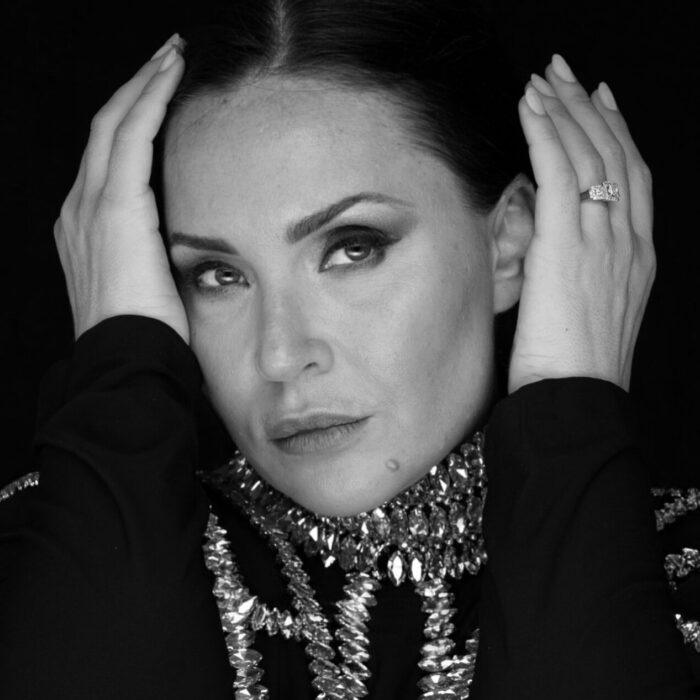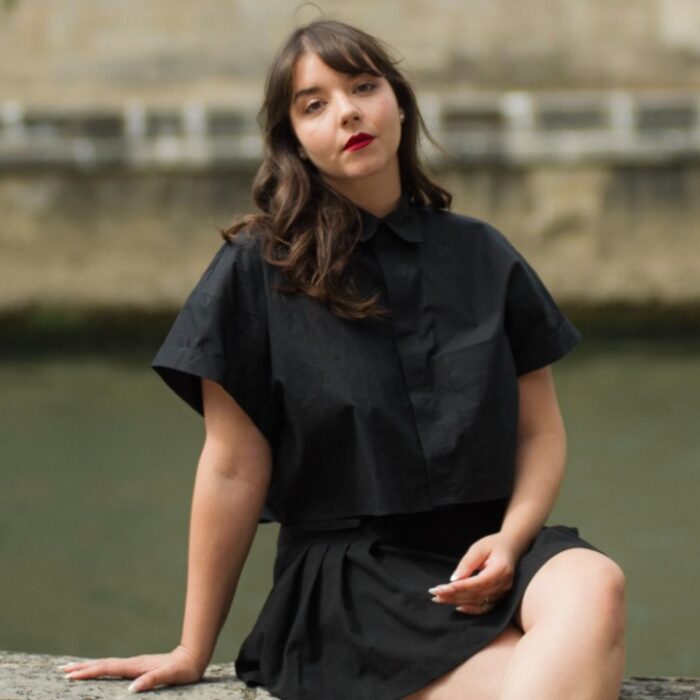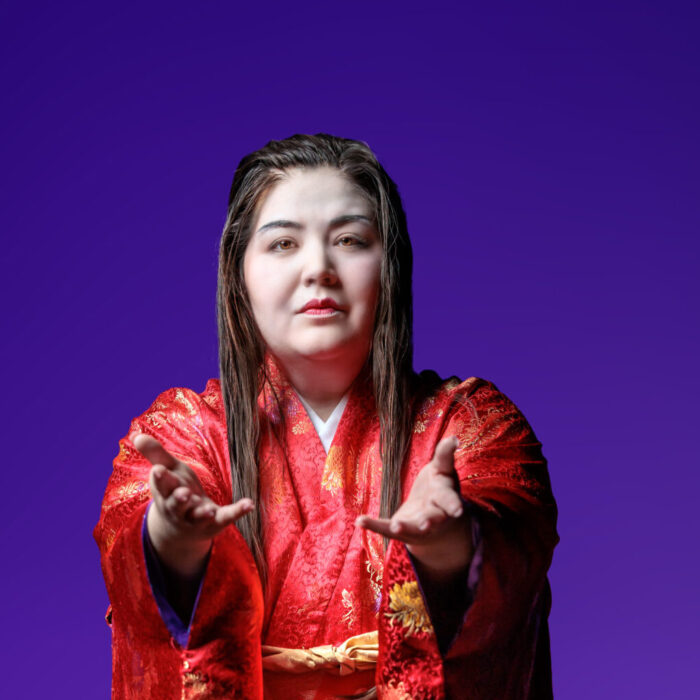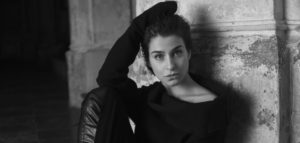
Q & A: Asmik Grigorian on ‘Salome,’ a New Chapter in Her Career & Letting Go of Her Father
By Ona Jarmalavičiūtė(Credit: Rokas Baltakys)
In just a little over a year or so, Soprano Asmik Grigorian has jumped into the spotlight and remained at the forefront of the opera world.
The big reason for the soprano’s rise to the forefront is her now iconic interpretation of “Salome” at the Salzburg Festival.
“The Lithuanian soprano captivates the audience as much as she captivates Herod,” stated BachTrack’s review of the Salzburg run. “Grigorian’s soprano is bright, rippled with steel and it slices tirelessly through a rampant Vienna Philharmonic.”
Grigorian was such a hit that the production, which premiered in 2018, was revived in 2019 with Grigorian, a rare move for the festival. The soprano has noted that this particular run of performances is a “one-year trail” as it has dominated her career’s identity since she made that famed debut.
But while she has experienced the highs of tremendous career success, she has also battled through personal challenges, mainly dealing with the passing of her father over the last fe wyears.
The soprano recently spoke to OperaWire about getting ready for a new season, a new phase in her career, a new quest for life motivation and a journey of self-reliance.
OperaWire: You mentioned that you are tired of the one-year-old trail of ‘Salome.’ You said goodbye to the role today. How was it for you?
Asmik Grigorian: You caught me after ‘Salome’s’ last performance, so I’m feeling very empty at the moment. The season was immensely hard and intense, with big debuts, new roles. The pressure on ‘Salome’ was immense and just now, when all of this has passed, I really understand how huge it was. Now it gives way to a feeling of emptiness, and at the same time, I do not have a single day off to rest and start a new season. So at the same time, I feel empty and in high tension. I also feel relieved that all this is over.
OW: You were worried about not being able to replicate last year’s success of ‘Salome’ because you have changed tremendously as a person. How was this year’s ‘Salome’ different?
AG: I am a very fast-moving and ever-changing person. Because I am open to everything that spins and moves around me. As a result, changes are happening to me very quickly. A year later I am a different person.
I feel extremely fortunate that this year we have not only been able to repeat what was last year, but to do it better than it was – what should be expected of a reproduction. Over the year, this role has grown, I feel much more at ease, and vocally more mature performing it. Now I know better where the main difficulties are and how to deal with it. As a result, the performance is quite different.
OW: You create a phenomenal interpretation of Salome, but while singing on stage you tell yourself a different story. Could you share more about it?
AG: Because I am not acting but expressing the character through myself, in each role I have to find some personal story that is close to the character’s experiences. Otherwise, it will not work. And since a year later, after returning to the same building, I found Salome, who is very different from last year’s, this year’s story is also different. Obviously, the personal story that was important to me a year ago is quite different today. If I would try to repeat it, it would never be so real, so exciting. As a result, last year’s Salome had its own personal story.
OW: How easy is it to later become detached from the character when you closely relate it to your own personal experiences?
AG: Apparently it is not easy for me. I have already come to terms with the fact that each role becomes a part of me. Every character that comes into my life changes me somehow. I look at the roles I play as my teachers, both in vocal terms and in the art of living in general. I accept them as part of my life I am learning from them. I also accept every person I meet in the same way. My roles, as well as the people I meet, are my primary teachers.
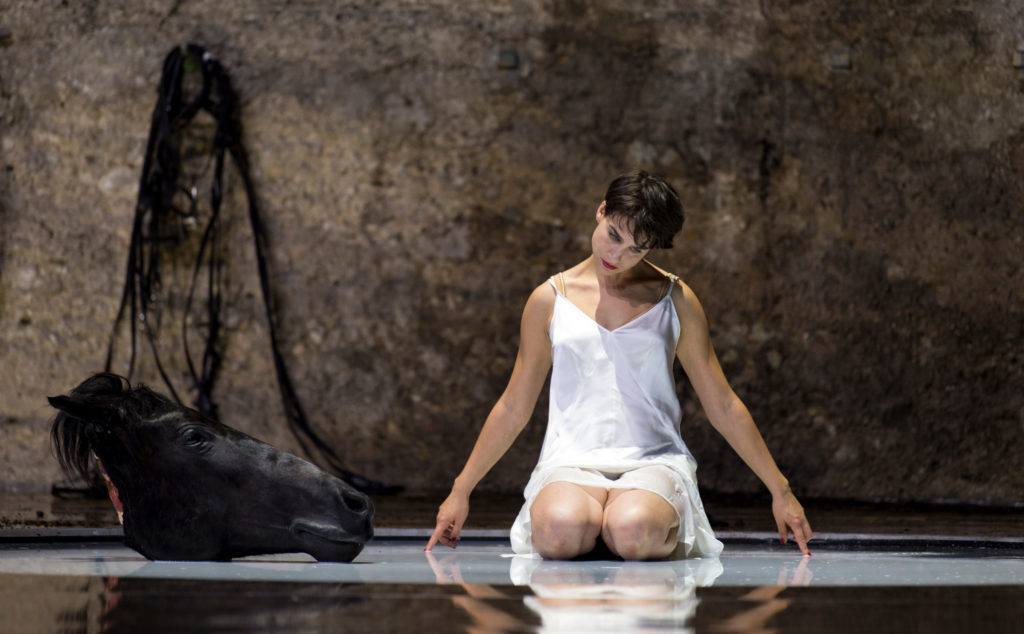
(Credit: Ruth Waltz)
OW: Which roles do you find the closest contact with?
AG: Basically this happens with every role. It all depends on the team, the people I am working with. But for me, all roles are the same – it’s always a human, only in different situations. Through such prism, I find contact with the character. I can understand the origin of human being and imagine myself in all these situations. That doesn’t mean that I had all the experiences my characters go through – neither did I murder or slay heads of my lovers.
When I say that all roles are parts of me, I mean they are all human and remain human, no matter what they have to experience. Because of this, for example, Salome and Tatyana are one and the same – they are both people to me, and only their life circumstances are different.
OW: You are constantly striving to bring the classic opera repertoire fresh and give your listeners new experiences. How do you search for creativity?
AG: That’s pretty funny because I’m not looking for anything. I like to do a well-known repertoire that people know by heart – how everything should sound, what has to be portrayed on stage. I naturally get to understand my roles from a human point of view, and I never specifically innovate. I think this is one of my strengths on stage.
OW: How important do you think the classic opera repertoire will play in the future?
AG: I believe that opera will still remain in the future as the genre itself changes with us. If it was so boring, it would be dead by now. Of course, opera music will never resemble pop or rock music. It will always have a much smaller audience. I think she will always be, just different from how we understand the opera today.
Now we are living in a different light and different sound. We no longer have silence in our lives. Even if you hear music, it is not enough for the sound to pass under your skin to your heart to make you feel something. As a result, it is clear that there is no chance that the natural voice on the opera stage would affect you when we have microphones, modern technology and so on. The opera needs to change, to move forward. But it has to be admitted that music is written genially, so it should remain in people’s lives.
As far as future trends are concerned, I begin to feel that the quality of the sound is longed for. I think that modern opera productions have already taken away all the negative side of human life experience and now other things are slowly coming back to the scenes – a search for light, goodness, beauty. Also, opera productions are becoming more and more abstract, at least from my point of view.
OW: How did your attitude towards the career of an opera soloist develop?
AG: Everything in my life has changed fundamentally. When I was a small child, of course, my parents were my aspiration. At one stage I wanted to do everything in the same way as they did, at another, I wanted to do everything differently. My desire or unwillingness to sing was also very vague in my youth.
I applied to music academy only because I was convinced in school that if I was already learning music, there was nothing else that I could be good in my life. I had ambitions, but I felt neither confidence nor desire to sing opera. I doubted if I was where I should be. I wanted to sing the different type of music, be a jazz or pop singer but I was afraid of other people’s opinions. They would think that I chose this path because I couldn’t sing opera. Because of this, I promised myself that first I would prove my worth in opera genre, and then I could just do what I want.
It’s funny because at this point, after the success of Salome, I realized that moment finally came. But now I am satisfied with what I do and I want to sing opera. That’s how things changed.
OW: Do you have people in your field, who you see as an example?
AG: Yes and no. I have never had an idol. In each role, I found a different singer whose interpretation impressed me. Each role has a different approach and one singer can’t be amazing in everything. Likewise in life – of course, many people are just fascinating to me, but I am not worshiping anyone. Everything changes every second. When I have problems and don’t know how to solve them, people who help always come naturally. And then they are an example to me.
OW: You lead an extremely busy lifestyle. What drives you forward?
AG: Physically, of course, there is always plenty of exercise, sports, and also I value sleep – before each performance, I have to sleep eight hours. Otherwise, I know I’m just tiring myself. And the greatest engine of my life is my love for people. I always work with a big team. I have many people who helped me in the past and are helping today. They change, of course, I meet many new faces. But every one of them remains in my heart. On the one hand, I’m introverted, but on the other, I’m a team person. If I feel completely broken, I still feel some responsibility to other people that are working with me. Being and working with other people is my biggest motivation in life.
OW: What is most difficult for you in your profession?
AG: The hardest part is finding peace with a sense of guilt towards your children. Of course, there is never enough family time and I feel guilty all the time. This feeling has been with me throughout my career since I became a mom before I started working. Both family and work require one hundred percent of your time and effort, and no matter how hard I try, one side is not in balance with the other. It is difficult to find and maintain the right balance.
Another difficult moment is saying goodbye to the people I meet along the way. Working in a company is the most enjoyable part of my job, and every fellow worker becomes dear to me, so I feel very empty when everything stops. Sometimes the same goes for farewell to the roles I play. The feeling of the end is always difficult for me.
OW: Do you feel like you have given up your personal life due to professional success?
AG: I am very happy to be an artist who does not give up her life for the profession. Learning how to find balance is not easy, but both of these things are equally precious to me and I would not sacrifice one for another. Now is the time when family life will have to change a great deal in my professional life. My daughter will soon start going to school and I will want to spend as much time with her as possible. So far I have had no such problem as she has always traveled with me. But I don’t feel like I have to sacrifice or give up anything now. It is my choice to work differently to have more joy and opportunities to be with my family. It’s simply a solution.
In fact, I am extremely fortunate to be able to maintain both a career and a family. I think two of my children were born at a very good time for me as well. When I gave birth to Noah, my first son, I was still a student and had more opportunities to spend more time with him, so I did not travel so intensely. And when I gave birth to a daughter, I had a different status, when I could afford to take my nanny, my mother-in-law to travel together with me. I could purchase travel for everyone, and rent bigger apartments. Everything went well and therefore I can spend time with my kids. If I have the opportunity to have breakfast with them and go to bed together in the evening, it is already enough.
OW: You mentioned that for the last three years, your professional engine has been Dad’s memory. What motivates you today?
AG: I am currently experiencing a turning point letting go of my dad. This is a tough phase as I understand that it is time for me to go and work alone – in my own shoes. In such a situation, most of all, I lack the time to just sit down and be with myself in peace and quiet. Inside I feel the great sense of emptiness at the end of the season, as well as the tension and business of every single day. I do not have time to properly nourish and set myself for a new professional phase. So far I’m not sure where things are headed. In the future, I will have to come up with some new motivation that would answer why am I doing it all.
OW: What are the plans for next season?
AG: The coming year again is difficult. If I survive until next summer’s Salzburg Festival, things will get a little easier. Then I’ll be able to relax a bit. But until then, I have to prepare three new roles.
Jenufa is a role debut, for which I feel a great responsibility. Norma is something radically different from what I have never done on a technical level. I know everyone is looking forward to this production because it is hard to imagine how I will interpret, perform, and whether I will be actually able to sing it. I feel the attention and it puts a lot of pressure on me. The risk is high; in this situation, the performance can be either very good or very bad.
Chrysothemis in the opera “Elektra” will be performed at the Salzburg Festival next summer. I’ve done this role in a concert version, but I haven’t done a performance. The intense season is anticipated.
